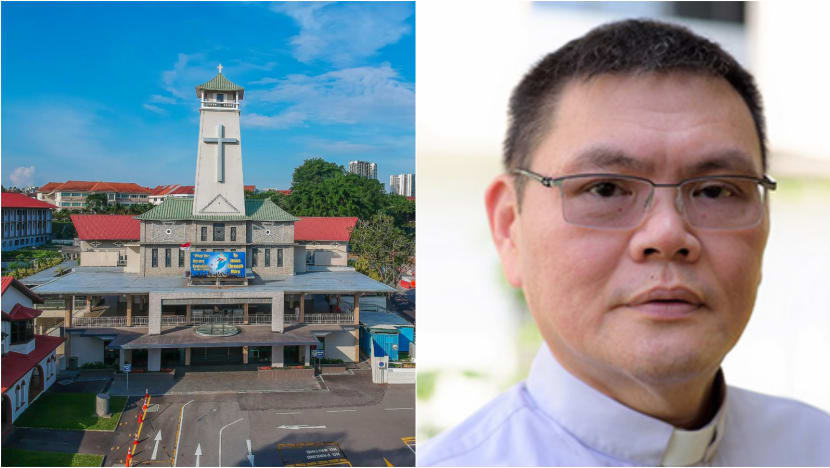Commentary: How Singapore managed the fallout from St Joseph’s Church priest stabbing
Beyond the trauma to the priest and those present during the attack at St Joseph’s Church, the incident also poses a risk to broader peace and stability in Singapore, says former journalist and NMP Nicholas Fang.

Composite of a view of St Joseph's Church along Upper Bukit Timah and its parish priest, Father Christopher Lee. (Photos: Facebook/St Joseph's Church Bukit Timah, myCatholicSG)

This audio is generated by an AI tool.
SINGAPORE: The stabbing of a Catholic priest at St Joseph’s Church on Saturday (Nov 9) was a shocking attack that stunned many who are unused to such violent assaults in the usually staid and peaceful Singapore.
That parish priest Father Christopher Lee was attacked during the monthly children’s mass was all the more horrific.
Beyond the trauma to those in the church at the time of the attack, especially young churchgoers, the incident also poses a risk to broader peace and stability in the country.
As is typical in such attacks, speculation on the motives of the attacker often spreads as quickly as news of it happening, however sparse the facts. There is also the possibility of fear and panic spreading over the potential for more attacks taking place.
Attacks that involve religion are particularly fraught with risk of inflaming sentiments between racial and religious groups, regardless of whether religion played a part in the attack.
In today’s technology-driven environment, digital and social media platforms allow for fear, unhappiness and inaccurate information to spread much faster than in years gone by, sometimes in ridiculous fashion.
In the hours following the attack for example, speculation in Telegram groups favoured by anti-vaccination individuals centered on whether the attacker had been affected or influenced by the COVID-19 vaccination.
QUICK, CLEAR AND COHERENT COMMUNICATION
The attack underlines the importance of how different stakeholders react in the immediate aftermath of a crisis.
The stabbing took place at around 6.30pm, and within hours, political office holders and the Singapore Police Force (SPF) took to social media to clarify salient details about the attack to tamp down on speculation, rumours and potential misinformation and disinformation.
Law and Home Affairs Minister K Shanmugam and the SPF shared on Facebook that the attacker was a Singaporean Sinhalese who had previously declared himself to be Christian, and who had a history of causing serious hurt and drug offences.
It was made clear that the attacker was believed to have acted alone, and that terrorism was not suspected.
Minister for Culture, Community and Youth Edwin Tong posted a statement condemning the attack, saying that “such violence, of any form and for any reason, has absolutely no place in Singapore, let alone at a place of worship”.
The SPF held a media briefing just after midnight to provide all available information at that time.
Relevant stakeholders also emphasised that Father Lee’s injuries were not life-threatening and that he was conscious and in a stable condition when taken to the hospital.
Some might say that these efforts could be seen as excessive given the scant details available at the time, and question why a more cautious approach could not be adopted when it came to releasing information about the attack.
But the recent tragic outbreak of violence in the United Kingdom earlier this year underlines why a surfeit of caution when it comes to information-sharing might not have been the best option.
LESS (INFORMATION) IS NOT MORE
In July, three children were tragically killed in a stabbing attack in Southport.
As the shock of the heinous attack swept the nation, little information was released about the suspect other than he was a 17-year-old because laws in the UK make it a criminal offence to identify a suspect who is a minor until legal proceedings begin.
But the lack of information from media organisations and local police led to unfounded speculation that resulted in a slew of Islamophobic and anti-immigrant posts on social media.
False claims about the suspect’s origins spread like wildfire, and there were also claims that he had arrived in the UK on a small boat in 2023, which subsequently turned out to be false. Authorities said there was evidence of potential state-backed efforts to amplify the spread of the false information.
These and other factors led to some of the worst violence the UK had experienced in more than a decade, with riots and protests breaking out across England and Northern Ireland, leading to more than 1,000 arrests.
The anonymity order on the suspected attacker’s identity was only lifted later due to the unrest erupting. He was identified as a teenager born to Rwandan parents in Cardiff, Wales, and not a Muslim immigrant.
PROTECTING A FRAGILE PEACE
The costs of the outbreak of violence in the UK are still being toted up, but the damage to social bonds and cohesion between racial and religious groups may persist for years to come.
There is no guarantee that being more forthcoming with facts and information would have helped the UK authorities lower temperatures and reduce the chances of violence breaking out, but it is clear that the reticence did not help, even if it was mandated by law.
In a small, open and digitally connected country like Singapore, it is not hard to imagine a more disastrous outcome if speculation, falsehoods or even foreign-backed efforts were used to exploit the St Joseph’s Church attack and destabilise its multi-racial and multi-religious society.
The attack is a stern reminder to Singaporeans to be mindful of how fragile peace and security are, and how easily they can be shattered.
We all have a part to play to protect that peace, whether it is by refraining from sharing unverified information or engaging in speculation should a crisis break out.
Nicholas Fang is a former Nominated Member of Parliament and journalist. He is founder and managing director of strategic communications consultancy Black Dot, and also runs a market research agency that operates a leading independent fact-checking platform in Singapore.


















